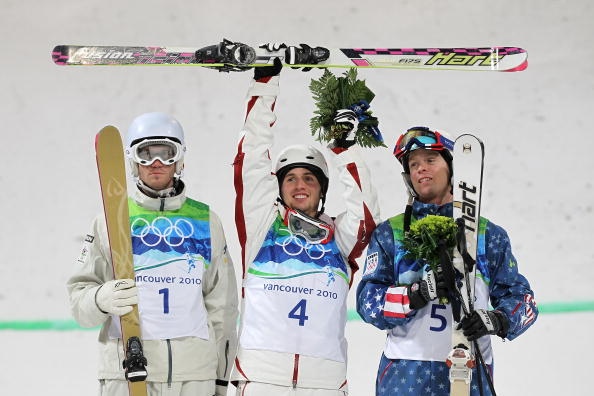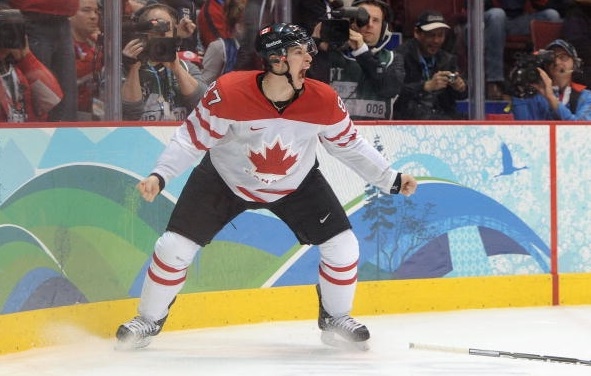Canada officially celebrated it’s 150th birthday on Saturday and it has been a patriotic ride; it’s safe to say that Canadians are proud of their heritage. One area Canadians continue to excel at is within the sporting world. Not only have we produced great moments both in North American sports and international competitions, we have produced moments across many different sports – a testament to our versatility as a country. In celebration of Canada’s milestone birthday, we take a look at the greatest moment from a variety of different sports.
Baseball – Joe Carter’s home run
Great Canadian baseball moments have come almost exclusively from the Toronto Blue Jays, especially since the Montreal Expos relocated to become the Washington Nationals in 2004. In the Jays’ history, two of the most iconic moments have come during the past two years; Bautista bat-flipping the Texas Rangers in one of the craziest innings in baseball history in 2015, and Edwin Encarnacion hitting the 11th-inning walk-off homer to send the Orioles packing from the 2016 AL Wild Card game. These two moments will forever go down in Blue Jays lore, but unfortunately they were only rungs in ladders that did not quite reach a World Series appearance, let alone victory.
This is what separates the great moments from the greatest moment - Joe Carter’s home run in 1993 to win the Blue Jays second consecutive World Series.
Since the left-field bomb was struck, and the famous “touch ‘em all, Joe” call was made by legendary Jays broadcaster Tom Cheek, the Toronto baseball franchise suffered a 22-year playoff drought before finally making it to October baseball again in 2015. Cue Bautista bat-flip.
Football – “The Kick”
Heading into the 1989 Grey Cup, the Saskatchewan Roughriders were certainly feeling the pressure. One of the most storied CFL franchises were entering into their 13th Grey Cup appearance. While this sounds like a franchise that had already enjoyed vast success in the league, they actually only had a single championship to show for it, going 1-11 in Grey Cup games prior to ’89. When the Hamilton Tiger-cats scored late in the 4th to tie it up at 40, it must have felt like another heartbreak was on the horizon. Luckily for the Saskatchewan faithful, a quick 48-yard drive led by quarterback Kent Austin set the stage for legendary Riders kicker Dave Ridgway to kick the game winning field goal through the uprights with only a few seconds left on the clock. The moment would be remembered as “the kick”, and brought the Grey Cup back to the prairies 23 years after their only previous championship.
Basketball – Steve Nash wins MVP
A sport that was invented by Canadian James Naismith has obviously produced some memorable moments such as the Raptors deep playoff runs and the famous Slam Dunk competition won by Vince Carter in 2000. Despite the flash and flare of Norman Powell’s Game 5 dunk against the Pacers, Kyle Lowry’s half-court shot to tie up the Heat in Game 2, or the ridiculous reverse-360 windmill dunk pulled off by Carter, no moment has been sweeter for Canadian basketball than Steve Nash winning league MVP (twice).
The crafty point guard revolutionized his position and has been attributed as a huge reason for Canadian basketball growth. Just the third point guard to ever win the award, and the first and only Canadian ever to win it, Steve Nash will go down as Canada’s first massive superstar and owner of the greatest Canadian moment in basketball history.
Soccer – Women’s National Team Wins Bronze in 2012
The men’s side of Canadian soccer has only seen one significant qualification during its history, when it qualified for the 1986 World Cup by winning the CONCACAF Championship in 1985.
Meanwhile, the women’s side has enjoyed a lot of success as one of the international superpowers in the sport, and it has caught the attention of people across the country. In 2015, Canada hosted the World Cup and brought out a record attendance of over 1.35 million throughout the tournament. They would eventually bow out in the quarterfinals to England, but it exemplified the love that Canadians had grown for the team and sport.
A lot of this love would have stemmed from the London 2012 Olympic Games in which Canada would win Bronze. It should be mentioned that the tournament is a little tainted by a baffling call that robbed Canada of a possible win in the semifinals against the States in which Norwegian referee Christina Pederson called an unprecedented six-second violation by goalkeeper Erin McLeod. The bizarre call would end up costing the Canadians their lead and eventually they lost the game.
Despite the bitter loss in the semifinals, Canada would rally around their Women’s team and they would go on to win Bronze. While a shot at Gold would have been better, the Games put Canadian Women’s soccer firmly at the centre of Canada’s attention, and it has not looked back since. Canada would go on to win another Bronze against the host Brazil during Rio 2016.

(Steve Russell/Getty Images)
Tennis - Milos Raonic Beats Roger Federer in Wimbledon Semifinal
Canadian tennis has taken off since the emergence of two stars; Milos Raonic and Eugenie Bouchard. The two have taken their respective tennis worlds by storm and have put Canadian tennis on the map. Between the two of them, the greatest moment came from Raonic when he reached the 2016 Wimbledon Men’s Singles Finals by beating one of Tennis’ all-time greats, Roger Federer. While Bouchard also advanced to the Wimbledon Finals in 2014 (and also won the Junior Wimbledon Championship at the age of 18), Raonic’s semifinal victory came in much more spectacular fashion. Down two sets to one, Raonic stuck around to win the last two sets against one of the most decorated tennis players of all-time 6-3, 6-7 (3-7), 4-6, 7-5, 6-3.
The marathon thriller set Raonic up to play Andy Murray in the final, but he would unfortunately lose that match in straight sets.
Golf - Mike Weir Wins the Masters
The most established male golfer in Canadian history is unquestionably Mike Weir, and he is the one that delivered our greatest golf moment. It came back in 2003 when Weir showed incredible resilience to win the Masters, one of the PGA Tour’s four major golf tournaments.
Sitting two shots back entering the final round, Weir and the rest of the field had to deal with one of the most incredible final rounds in Masters’ history when American Len Mattiace shot a -7 (65). It seemed that everything was going right for Mattiace but Weir would keep chipping away and eventually took advantage of Mattiace’s bogey on 18 to force a playoff. Weir stepped up and won the first playoff hole to become the first and only Canadian male to win a major championship (Sandra Post and Brooke Henderson have done it on the female side). Canadian golf fans will always remember the iconic moment of Weir receiving the coveted green Masters jacket from 2002 winner and golf legend Tiger Woods.
Summer Olympics – Donovan Bailey Wins Gold
If we ranked the greatest instantaneous moment in Canadian Summer Olympic Games history it would likely be Ben Johnson’s Gold Medal run in the 100m final of Seoul 1988. Unfortunately, that moment was quickly tarnished when Johnson was implicated for steroid use just two days after the run. So instead we celebrate Canada’s redemption in Atlanta during the 1996 Olympic games when Donovan Bailey reclaimed Canada’s spot atop the podium.
Bailey had spent the year leading up to Atlanta tearing up the track, setting a 50m world record and winning a World Championship title in both the 100m and the 4x100m relay. Canada’s hope to win Gold came to fruition and brought with it a breath of fresh air after the Johnson debacle eight years earlier. Bailey became just the second person to hold the three major titles of Olympic Champion, World Champion, and world record holder at the same time, following Carl Lewis.

(Michael Cooper/ Getty Images)
Winter Olympics – Alex Bilodeau Wins Gold
To be honest, the greatest moment in Winter Olympic history is probably actually Crosby’s golden goal, but we touch on that in a little bit so instead we will look at Alex Bilodeau’s famous Gold medal victory in Men’s Moguls during Vancouver 2010.
Bilodeau’s victory was both exciting and historic, as his step to the top of the podium marked the first time a Canadian had won Gold on home soil. It also marked the first Gold medal of Canada’s record 14 throughout the Games and kicked off Vancouver 2010 in the most exciting way possible. One of the greatest moments of the event was when Bilodeau received his first place ranking with just one skier to go and the cameras showed an elate Frederic Bilodeau in the crowd. Frederic, Alex’s older brother, was diagnosed with cerebral palsy and told that he would be unable to walk by the age of 12. Frederic is still has the ability to walk today, though he does use a wheelchair, and Alex has called his brother a hero and his inspiration. He dedicated the Gold medal to him.

(Jamie Squire/ Getty Images)
To prove that 2010 wasn’t a fluke, Bilodeau would go on to win Gold in Sochi 2014 as well.
Formula 1 – Jacques Villeneuve Wins World Championship
Jacques Villeneuve is the most decorated auto-racer in Canadian history, and there is no greater moment in his career than his famous crash-and-pass of Michael Schumacher in the European Grand Prix at Jerez.
Villeneuve finished second in the World Championship standings (the culmination of racer’s appearances over a season that shows their overall ranking that year) during his debut season in 1996, making Villeneuve the record holder for highest standing appearance in a debut season (Since matched by Lewis Hamilton in 2007), and he carried that momentum right into 1997 where he found himself one point behind Michael Schumacher in the World Championship standings heading into the final race at Jerez.
Past the midway point of the race, Villeneuve had managed to keep a close distance between himself and Schumacher, waiting for his moment to pounce. With 22 laps remaining, Villeneuve made his move. Schumacher went to make his turn and collided with the Canadian driver, resulting in some damage to Villeneuve’s sidepod but ultimately allowing him to finish the race. Schumacher was not so lucky; his car would sputter out to the side rock bedding and ultimately force him to retire from the race. While Schumacher has never confirmed or denied that the crash was a deliberate attempt to take out Villeneuve, resulting in a World Championship win by default, he faced waves of adversity following the race and was shamed by German newspapers. Villeneuve’s famous passing of Schumacher marks the greatest moment in Canadian auto-racing history.
Boxing – George Chuvalo vs. Muhammad Ali
Want to hear a good Canadian story? On March 29, 1966, George Chuvalo immortalized himself by going the distance with Muhammad Ali in an epic 15-round bout at Maple Leaf Gardens. The fight was particularly memorable because of the social context outside the ropes. Muhammad Ali had recently become a member of the Nation of Islam, and a conscientious objector to the Vietnam War. This caused him to be stripped of his Heavyweight Champion title and banned from venues across the U.S.A.
While Ali was being painted as a disturber, Chuvalo has gone on to say that he had no problem with Ali’s stance, and that it actually made a lot of sense. What makes Chuvalo’s performance even more impressive is that he had only 17 days to prepare for it after the original fighter scheduled, Ernie Terrell, backed out with only a few weeks to go until the event.
Ali would go on to win the fight, but Chuvalo’s fight was met with huge praise. Ali even said that Chuvalo was the toughest man he’s ever fought, and went on to praise Canada and the people that call it home. After it was all said and done, Ali went to the hospital with Kidney injuries. Chuvalo went dancing with his wife.
Hockey – Sidney Crosby’s Golden Goal
Hockey is definitely the most abundant source if you’re looking for spectacular Canadian moments. If you take all the hockey moments over the past hundred years and boil it down to the single best Canadian moment in hockey history you end up with two clear front-runners; Paul Henderson’s goal in 1972 to win the Summit Series against Russia, and Sidney Crosby’s “golden goal” during the 2010 Olympics.
In the end, we give the edge to Crosby.
Henderson’s goal was significant because of the social and political factors that were happening at the time. The Soviet Union was using sport supremacy as a way to indicate the success of a communist regime, making the 1972 Summit Series almost more of a battle between cultures and ways of life than between two hockey teams.
While Henderson’s goal was huge for Canada beyond just the hockey world, Crosby’s goal gets the nod on this list due to it being distinctly and utterly about Canada. First of all, it happened on Canadian soil. The 2010 Winter Olympics in Vancouver had already been huge for Canada, seeing the home country win their first Gold medal on home soil, while also seeing them win 12 more leading into the final event – the Gold medal game between Canada and their North American rival the U.S.A.
After a demoralizing late third period goal by Zach Parise to tie the game, Canadian coach Mike Babcock took his team into the locker room and, as summarized in a later interview with CBC, he gave them a simple motivational message, “ This thing is going to be over fast, there’s too much talent on the ice. One of you is going to be a hero for the rest of your life.”Sure enough, less than eight minutes into the Overtime period, Crosby received a pass from Jerome Iginla and snuck it past American goalie Ryan Miller from a sharp angle, cementing his name in history as scorer of the Golden Goal.

(Harry How/Getty Image)
The goal gave Canada it’s 14th gold of the Games, a record that still stands today, and it happened on home ice.
Terry Fox’s Incredible Run
While it’s not technically a moment from a professional sports league, you can’t make a list of greatest Canadian feats in sports and not mention the famous and courageous run by Terry Fox in 1980. The run named “The Marathon of Hope” stretched 5,373 kilometres before Fox learned that the cancer he was running to fight against had spread to his lungs. After running a marathon per day (26 miles, or almost 42km) for 137 days, Fox’s famous run came to an end in Thunder Bay, Ontario. In 1981, Fox lost his incredible battle with cancer, but his name continues to garner a massive amount of donations through the Terry Fox Foundation and the Terry Fox run, accumulating over half a billion dollars to date.




